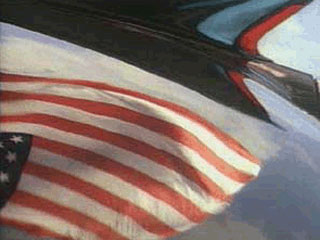
 |
| ARTISTS | BRUCE & NORMAN YONEMOTO | |||||
| RETROSPECTIVE EVE SUSSMAN DOUG AITKEN CHARLES DE MEAUX EUAN MACDONALD BRIAN ALFRED, ARA PETERSON, & MARK TITCHNER AÏDA RUILOVA SONG DONG KIM SOOJA CARLOS Amorales GüNTHER SELICHAR JANAINA TSCHAPE, HIRAKI SAWA & THE NEISTAT BROTHERS Marina Zurkow, Scott Paterson & Julian Bleecker JEREMY BLAKE THOMAS STRUTH WILLIAM WEGMAN GENEVIèVE CADIEUX Gary Hill, Mary Lucier & Michael Snow JEFF GIBSON DAY WITH(OUT) ART 2001 BRUCE & NORMAN YONEMOTO WILLIAM KENTRIDGE FISCHLI & WEISS MARCO BRAMBILLA TIBOR KALMAN PRESS DIRECTIONS |
Creative Time and Panasonic, in an effort to broaden public discussion of the impact of the September 11th attacks, will present ahistory (1992) by Bruce and Norman Yonemoto — a powerful work reflecting on national identity. Launching on October 29 and running through November 30, ahistory is part of The 59th Minute: Video Art on the Times Square Astrovision, an ongoing series of video artworks by international artists. Bruce and Norman Yonemoto’s ahistory references national monuments and symbols from around the world to explore how iconography can inform notions of our national identity, collective memory and history which today, when our nation’s psyche is heavy with questions about ourselves and our futures, strikes a resonant chord. Like all videos in the series, ahistory will air the last minute of every hour of the Astrovision programming day (6am-1am) with the exception of two daily preemptions for NBC’s Today Show and Nightly News. In ahistory, a classic Cadillac glimmers with reflections of national monuments from around the world — Paris’ Eiffel Tower, Athens’ Parthenon, the Roman Coliseum, the London Bridge, the American flag, concluding with a vista of Joshua Tree National Park in California. Each landmark reflected on the car’s surface identifies its respective country, reminding us of shared experiences, national identity and history. The car is a classic emblem of America’s post-World War II strength, freedom, and pursuit of the American dream, and the flag reflected on the car’s surface is an emblem of American identity. Yet, underlying the flag’s positive symbolism, its (upside-down) orientation is an official symbol of distress and a call for help and therefore today, is especially poignant. As the minute-long video concludes with a still shot of the expansive desert landscape of Joshua Tree, the viewer is asked to consider our destiny, what roads we will create and what paths we will take. Born and raised in California, in the wake of World War II to a family of Japanese descent, Bruce and Norman Yonemoto were faced with complexities of national identity and history. The Yonemoto brothers have developed a body of work which positions itself within the overlapping intersections of art and commerce, of the gallery world and the television screen. They believe that the composition of mass media has become a new historical site of the domination of human behavior. During their twenty-year collaboration, they have been honored with numerous awards and grants from the National Endowment for the Arts, the American Film Institute, The Rockefeller Foundation, and the Maya Deren Award for Experimental Film and Video. They are included in collections around the world in the US, Japan, Europe and South America.
|
 ahistory October 19, 2001 - November 30, 2001 |
||||